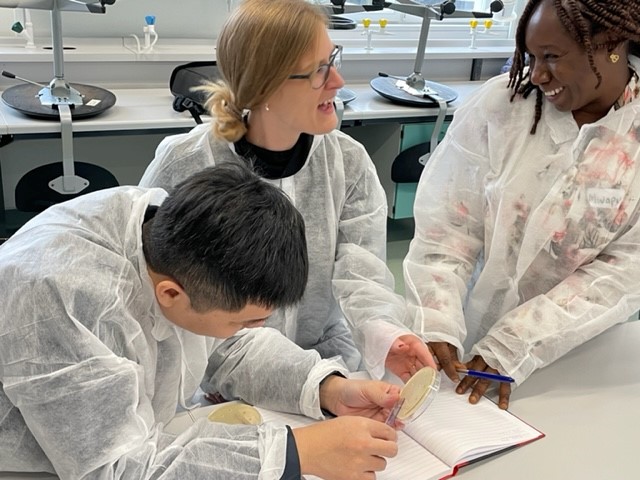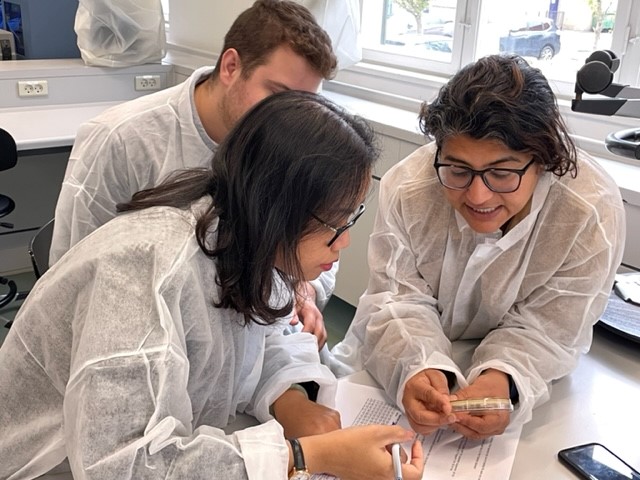On 26 September 2022, ICARS team members from diverse professional backgrounds participated in an introductory session on AMR testing and interpretation at the University of Copenhagen. The session was part of a short course called ‘Policy Development and Implementation of Interventions to Control AMR’, aimed at government officials and policymakers from Low- and Middle-Income Countries (LMICs) working in areas related to AMR.
The three-week course, run by the University of Copenhagen (UCPH), kicked off with a hands-on introduction to AMR interpretation in a laboratory at the UCPH Frederiksberg Campus. ICARS staff and course participants from LMICs worked together to learn about and practice the process of testing samples of bacterial cultures against antibacterial compounds to measure antimicrobial susceptibility. Through the course the participants from Mexico, Vietnam, Nigeria and Kenya will be exposed to how Danish government institutions and livestock industry use research-based evidence in their policy making and actions to prevent and control AMR.
Antimicrobial Susceptibility Testing (AST) is the laboratory procedure performed to determine which antimicrobials would effectively tackle a specific bacterial pathogen. Reliable AST capacities are necessary to understand the circulating resistance levels and patterns, which is critical for good antimicrobial stewardship.
The lab session brought people who work on AMR at the project or policy level closer to the procedures and technical challenges of assessing samples for antimicrobial resistance. Hands-on experience was obtained by testing susceptibility of E. coli and Salmonella strains streaked onto Petri dishes with antimicrobial discs as well as the minimum inhibitory concentration (MIC) method, where resistance is measured based on bacterial growth in broth medium containing different antimicrobial concentrations.
By the end of the course, participants will have in-depth knowledge about how to set priorities and to develop evidence-based, context-specific and cost-effective solutions to mitigate AMR in humans, livestock and the environment in LMICs. In addition, the course will build a deeper understanding of AMR policy from the lens of intervention and implementation research. Discussions between researchers and policymakers from all over the world, both among participants and lecturers, will enable meaningful exchange of knowledge and experiences on how to best tackle AMR on a national, regional and global scale.
“This training was a great opportunity for hands-on learning to better understand techniques for our team members, which will help us provide better support to ICARS projects. A great benefit was also networking with AMR leaders from the participating countries, and we look forward to engaging throughout the course”.
Erica Westwood, Implementation Research Officer, ICARS

Related Projects
Reliable AST is a prerequisite for the appropriate treatment of infections in humans, livestock and aquaculture. ICARS are currently engaged in several projects aimed at strengthening lab capacity to deliver more timely and accurate diagnostics that enable the prudent use of antimicrobials among human and animal health workers.
In Georgia a feasibility study is underway on the use of MALDI-TOF and Rapid Antimicrobial Susceptibility Testing (RAST) as part of an antimicrobial stewardship program for the management of bloodstream infections in all departments in two hospitals located in the capital city, Tbilisi.
In Kenya, a collaborative project with the International Livestock Research Institute, will establish an AST Center of Excellence for serving countries in Africa, covering pathogens in humans, livestock and aquaculture. The Center will support both human and veterinary clinical microbiology laboratories in Africa in all aspects of AST, including the development of standard operating procedures, offer training, provide support for troubleshooting, and perform comparison and quality control across manufacturers.

